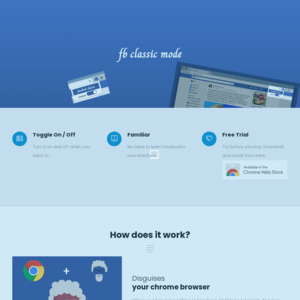While I like aspects of Facebook's new design, I found some glitches e.g. comments on pictures weren't visible, poor resolution on suggested videos etc., and overall I felt that there wasn't enough 'visual separation' between the different parts. So I was a bit annoyed when they forced me to the new design and removed the button.
This little extension (chrome-only, Firefox coming soon) disguises your chrome browser as an older version, for which Facebook will then send the old design. It only does this when talking to Facebook, not other sites.
I've set the normal price at $5 because I thought I'd see how it goes with a Facebook ad campaign, and of course that'll cost money to run. I haven't done that yet; ozbargain is my first stop (since you guys have given me so many discounts)! If you miss this deal (it expires tomorrow), a Facebook share will bring down the normal price to $1.
As an aside, this is also a something of a developer's experiment in monetizing a chrome extension, since Google removed the ability for chrome extension authors to charge via the chrome webstore earlier this year.
Instructions
- Follow the link and enter the coupon code above at checkout, which will bring the price down to $0.
- You'll be emailed a license key.
- Install the chrome extension. You'll automatically get a 24-hour free trial.
- When you browse to Facebook.com you should get a dialog with a 'purchase' button and a license key; enter the license key from your email.
If you like it, please upvote it here and rate it 5* on the chrome extension's page. If you have issues, please PM me and I'll try to respond as best I can.
![[Chrome] Free: FB Classic Chrome Extension (Normally $5) @ Gumroad](https://files.ozbargain.com.au/n/92/568192.jpg?h=b6c78ae5)

https://www.theverge.com/2020/9/22/21451111/google-paid-chro…
Google is shutting down paid Chrome extensions offered on the Chrome Web Store, the company announced today. That means that developers who are trying to monetize their extensions will have to do so with other payment-handling systems.
As of Monday, developers can no longer make new paid extensions, according to Google — though that’s cementing a policy that has already been in place since March. And that policy follows a temporary suspension of publishing paid extensions in January after Google noticed an uptick in fraudulent transactions that “aim[ed] to exploit users.”